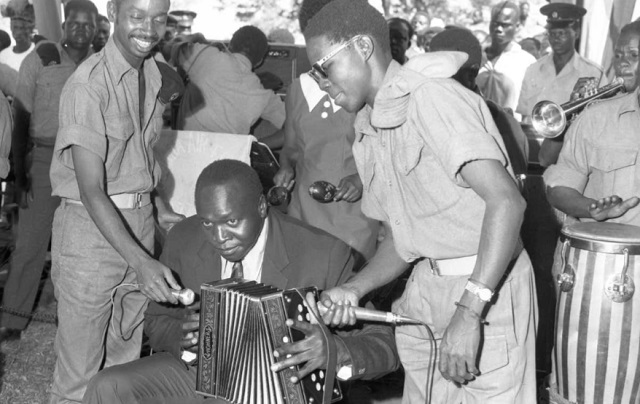
Thousands of recently discovered photographs document his reign
ANALYSIS | Derek R. Peterson & Richard Vokes | In 2015, researchers working in the storeroom at the Uganda Broadcasting Corporation forced open the lock on an unremarkable filing cabinet.
Inside were thousands of small wax envelopes, neatly arranged in rows, each containing a number of medium-format photographic negatives. In all there were 70,000 images. The vast majority of them date to the 1970s and the presidency of Idi Amin.
Amin is one of the 20th century’s most notorious dictators. In a recent PBS television series, he features alongside Kim Il Sung, Mussolini and other “Profiles in Tyranny.” In Uganda, the memory of the Amin years has been suppressed by a government keen to promote political amnesia. There are no memorials to the dead; neither are there monuments or other institutions that encourage deliberation over the Amin years.
These photographs offer one of the first opportunities for public reflection, and a small selection of them – about 150 images – are now on display at the Uganda Museum in Kampala. The exhibition, which we helped curate, is titled “The Unseen Archive of Idi Amin” and will be open until the end of 2019. For Ugandans and other visitors it is a place where a traumatic and divisive history can be assessed.
Amin’s aggressive populism
Idi Amin came to power in 1971 after overthrowing the government of Milton Obote, the president who had presided over Uganda’s independence from British colonial rule.
Obote had relied on state-run media to amplify his political power, and Amin inherited a powerful network of radio stations. The extensive reach of official media encouraged Amin and his officials to think of themselves as spokesmen for Ugandan commoners. Issues that had formerly been decided behind closed doors were discussed openly; matters that had once been determined by experts were made subject to the popular will. For some people it was hugely empowering. For others – especially for civil servants and other professionals – the Amin government’s aggressive populism was a mortal threat.
Photographers were a constant presence on the occasions when Amin and his officials addressed the public. For the whole period of his presidency, a dedicated team of photographers from Uganda’s Ministry of Information followed Amin around the country, snapping photos at press conferences, rallies, parties and other events.
As far as we know, very few of the photos they took were ever printed or published. The film was developed, and then the negatives were placed in envelopes, labeled and placed in a cabinet.
This had been, until now, an unseen archive.

 The Independent Uganda: You get the Truth we Pay the Price
The Independent Uganda: You get the Truth we Pay the Price



“Amin’s administration governed Uganda with the fervor and energy of a military campaign. It targeted otherwise obscure social issues – smuggling, overcharging consumers, the dominance of Asian business interests in the economy, the cleanliness of city streets – and transformed them into urgent political problems that demanded action.”
The Asian dominance of Uganda’s economy built over almost sixty years was not a peripheral social issue, preordained or a result of Ugandans failing to capitalize on the prevailing economic opportunities. But the result of a deliberate and systematic repression of the economic and social aspirations of Ugandans by the racist colonial British imperialists that imposed discriminative ordinances,laws, rules such as the 1908 Uganda Cotton Ordinance that restricted Ugandans to peasant farming of cotton while stopping these Ugandans’ engagement in the more financially rewarding trading,ginning etc of cotton Uganda’s then leading cash crop during those sixty years and all done for the benefit of the usually these crafty Indian immigrants from British-India.
By the 1950s this had led to the total dominance of Uganda’s Economy by these crafty Indian immigrants with questionable sharp business practices that worse engaged in racism against Ugandans in their own land and as a result Augusto Kamya and others organized a trade boycott of the Indian businesses in the 1959 to try to rectify this historic Injustice. The Indian trade boycott was successful as it involved and had the support of a wide section of Ugandan society forcing the British Overlords to somewhat belatedly open up the Economy to Ugandans but unfortunately by then the head start and capital the Indian immigrant had accumulated by them negated this.
From 1962 to 1970, the government of Obote initiated actions to further rectify that economical historic Injustice by Nationalizing foreign owned businesses, passing of the 1969 Trade License act that was aimed at restricting Indian participation in certain sections of Uganda’s economy and ensuring it’s control by Ugandans.
Hence as can be seen from above, the 1972 expulsion of the Indians by President Idi Amin, was a continuation of rectifying that economical historic Injustice,bringing a conclusion to the Ugandanizing of Uganda’s economy & also aimed at achieving total and complete Independence of Uganda and had wide the wide support of Ugandans.
In conclusion,
-Was it wrong to rectify the injustice of the British created and imposed Indian dominance of Uganda’ economy ? The answer is a resounding No.
-Was the Indian domination of Uganda’s economy a peripheral social issue to Ugandans? Again No.
-Was President Idi Amin’s 1972 expulsion of Indians unfounded? No
-Did the expulsion create room for Ugandan entrepreneurs and promote Ugandanizing the economy ? Yes it did.
-Did the expulsion cause economic hardships to Ugandans? Yes it did as one would expect of birthing pains when creating a new world order.
Nothing wrong with any of that sir. But his policy of widespread killing of innocent civillians, perceived political opponents, negated any of those achievements.
His legacy will remain that he was a mass murderer, period!